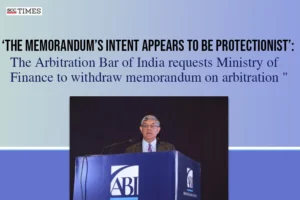The Arbitration Bar of India (ABI) and the Indian Arbitration Forum (AIF) recently addressed a letter to the Ministry of Finance, Department of Expenditure — Procurement Policy Division, expressing their concerns over a recent Memorandum issued by the Ministry.
This Memorandum contains several recommendations and observations regarding the adoption of arbitration as a method of dispute resolution in procurement contracts and tenders. The Memorandum proposes that arbitration should not be routinely or automatically included in procurement contracts or tenders, especially in large contracts and suggests that arbitration should be restricted to disputes with a value of less than Rs. 10 crores. This value pertains to the dispute itself, not the overall value of the contract, which could be significantly higher.
Additionally, the Memorandum recommends that the inclusion of arbitration clauses for disputes exceeding Rs. 10 crores should be carefully considered, with reasons recorded and approvals obtained from appropriate authorities.
The Memorandum advises against routinely challenging decisions that go against the government or public sector enterprises, suggesting that challenges should only be made when there is a genuine merit to the case and a high likelihood of success in higher courts.
Furthermore, the Memorandum encourages government departments and entities to avoid and settle as many disputes as possible using mechanisms available within the contract. It also promotes the adoption of mediation under the Mediation Act, 2023, and negotiated settlements for dispute resolution. For high-value matters, it suggests the constitution of a High-Level Committee (HLC) for dispute resolution, which may include a retired judge and a retired high-ranking officer or technical expert.
Senior Advocate Gourab Banerji, President of the ABI, highlighted in the letter that the suggestions in the Memorandum contradicted the Government’s intent to promote arbitration as a method of alternate dispute resolution. He referenced the Prime Minister’s speech at the National Initiative towards Strengthening Arbitration and Enforcement in India, where the Prime Minister emphasized creating a vibrant ecosystem for institutional arbitration as a top government priority, stating “Creation of a vibrant ecosystem for institutional arbitration, is one of the foremost priorities of our government… An enabling alternate dispute resolution ecosystem is a national priority for India. We need to promote India globally as an arbitration hub.” Further mentioning that this sentiment was echoed by the Minister of Law and Justice, who noted that a robust dispute resolution mechanism is essential for trade, industry, commerce, and investment to thrive. The Minister for External Affairs also emphasize the importance of arbitration in facilitating international trade and investment, stressing that a stable and predictable dispute resolution mechanism fosters confidence among foreign investors.
ABI expressed concern that the Memorandum’s recommendation to avoid routine inclusion of arbitration in procurement contracts undermined the government’s efforts to promote arbitration, further arguing that restricting arbitration to disputes below Rs. 10 crores would exclude many disputes from arbitration, increasing the burden on courts, warning that this shift away from arbitration could reverse the government’s progress in promoting ease of doing business, negatively impacting investment and potentially lowering India’s ranking in the World Bank’s Ease of Doing Business index.
It was further stated by the ABI that the Memorandum ignores the consequence of relegating parties to the courts if arbitration agreements are absent, especially given the judiciary’s already overwhelmed caseload, expecting courts to handle the additional burden of disputes typically resolved through arbitration would be unrealistic and further that this preference for litigation over arbitration would dissuade foreign investments.
ABI in its letter has emphasized that reverting to litigation rather than arbitration would diminish domestic appetite for bidding on projects, especially in the infrastructure sector, due to the time and cost implications of court disputes and this shift would hinder commercial growth and investment, setting back progress significantly.
The ABI has commended the government’s initiative to incorporate mediation as a method of dispute resolution and recommended several measures for enhancement:
1. Encourage the inclusion of Med-Arb clauses in government contracts.
2. Ensure that only independent, unbiased, expert, and accredited mediators are appointed to maximize mediation benefits.
3. Allow government officials to present settlement proposals without fear of repercussions or vigilance inquiries.
4. Establish committees composed of independent experts not employed by the government to review settlement proposals by government officials. These committees should provide fair and fearless guidance on dispute settlements, and their decisions should be final and binding, with the government adhering to their instructions.
5. Immediately remove arbitration clauses in government contracts that involve unilateral appointment processes. Replace clauses that restrict arbitrator appointments to a narrow pool, often including ex-officials, with ones ensuring a fair and mutual appointment process.
6. Eliminate arbitration clauses that divert high-value disputes to courts instead of arbitration, maintaining a uniform and consistent approach.
7. Integrate model arbitration clauses from institutions into government contracts.
8. Adopt a model code of conduct for arbitrations to help the government achieve time and cost efficiencies.
9. Form committees of independent experts not employed by the government to review arbitration awards and recommend whether to challenge them. These recommendations should generally be followed, with deviations requiring proper reasons documented in writing.
The ABI urged the Ministry to reconsider and withdraw the current Memorandum, suggesting that the government’s commitment to promoting arbitration can be realized by considering the organization’s extensive experience and the aforementioned recommendations. The letter concluded on a hopeful note, invoking the sentiment expressed by the Minister for External Affairs: “‘Arbitrate in India’ is truly an aspect of Make in India.”

